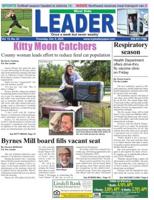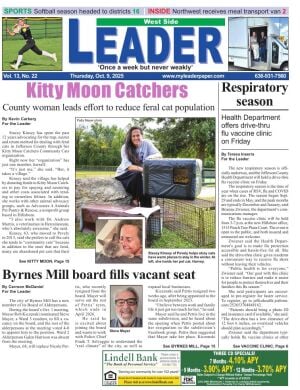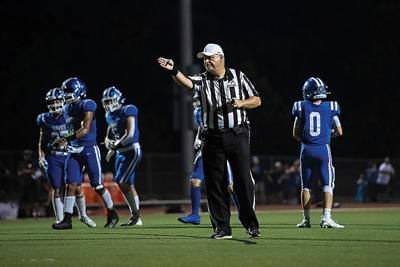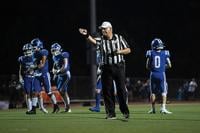Unless more people become officials for high school football, the Friday night lights could go dark across Missouri and the country.
Already, schools around the state are planning to play on Thursdays or Saturdays starting next year as officiating crews work extra duty to cover the games. The shortage of officials impacts every level of the sport, down to junior high. Schedulers more frequently are making desperate calls outside of their associations to assemble a crew for a game. Five officials are required for varsity, four for the lower levels.
Kenny Seifert retired from the Missouri State High School Activities Association as an associate executive director last year, but still serves as director of officiating. Before Seifert joined the organization in 2016, he was an official and basketball coach. He said last week a member school’s homecoming football game was in danger of being canceled because the officiating crew was two people short. Seifert went into action, contacting the officiating associations from Mark Twain, Mexico, Northeast (Kirksville), Columbia and Jefferson City, all to no avail.
Any activities director’s biggest nightmare is having to cancel Homecoming, one of the most important weekends of the year for any school.
“(All of the northern and western associations) called me Wednesday morning and said we have no one. The only option I saw was to move the football game. But the AD (at the school) and officials in St. Louis found two from the Kansas City area, and they agreed to drive there.”
The state paid for those officials’ mileage, for sure, and it’s likely they received a hero’s welcome by the school. But they were thrown in with three other officials they’d never worked with – not an ideal situation, but one that’s occurring more often, although usually in less dramatic fashion.
“When they get there, they all have to share information with each other,” Seifert said. “That’s an extreme story, but it just happened. It’s in the nature of an official to help out.
“On the other side of the coin, what we ended up with was a mixed crew.”
Seifert said it’s more common to see officials moving up to varsity games in their first or second year rather than first gaining as much valuable experience as possible at the lower levels. That didn’t happen 10 years ago. It took several years toiling at junior high, freshman and JV games before an official got promoted to Friday nights. Officials not only have to interpret the rulebook and its annual changes, they have to apply it in real time before raucous crowds of fans.
Seifert travels the state, going to many universities to talk to students about the benefits of becoming an official.
“The first thing I always hope, for however long they’re going to do it, is I hope their experience is good,” he said. “Jobs, health, families change, so we understand the ebbs and flows of how officiating fits into their lives. (It’s like) the official who gets a promotion at work, so now he can’t leave at 3:00 to go umpire a softball game.”
When Seifert sells candidates on the benefits of officiating, he talks about how it’s a good way to make extra money and stay connected to the sport they love after their playing days are over.
“Finding coaches doesn’t seem to be a problem (for most sports),” he said. “We need to make people aware of the opportunities that are available through officiating.”
Pat Burns has been an area scheduler for football, basketball, volleyball, field hockey, swimming and diving and water polo for the past five years. He oversees 220 football officials. He said the need depends on the day of the week since each level plays on a different day. Fully staffing 16 varsity games on a Friday requires 80 officials. The JV plays on Mondays at 23 or 24 sites, requiring 100 officials. Burns said he doesn’t have a problem filling varsity games.
“The lower levels are like a giant Jenga game,” Burns said. “This time of year I hope someone cancels a game so I can send them to slots I have open. There are times I put people on varsity games without as much experience, but I will fill those spots.”
To become an official for MSHSAA, you to have score at least 80 on a written test and attend mechanics clinics for three years of on-the-job training. After that and paying a $65 fee, you are eligible to work. More training is available every August. The St. Louis Officials Association runs the Officials Development Program.
“Once I get them into my system and I have, say, a Jefferson County lower-level game, I’ll pair them up with at least two experienced officials,” Burns said. “Moving up is a lot faster than it was 15 or 20 years ago. If you show promise within your first two or three years, there’s a good chance you’ll be on a varsity crew.”
Burns also schedules local officials for college football games. They’re paid between $850 to $1,000 for a weekend. He said some of those people will work a junior high game for $135. High school varsity officials are paid $150 for one game, while freshman, JV and middle school doubleheaders earn $135; a single freshman/JV game is $79. The school districts pay the officiating fees.
This is the third year of three-year pay cycle. Before this cycle, varsity games paid $112. Burns said there’s been talk of raising it to $35 an hour, or $170 per game. An ad-hoc committee of activities directors will meet in October to decide the pay structure that will take effect next spring.
Seifert said Missouri is in line with other states in terms of pay.
“The last time this came up (for review), the numbers were all over the place and there wasn’t a rhyme or reason who was getting paid what,” Burns said. “We used $35 an hour as a target for varsity and $30 for lower levels. We looked at how much time was needed for every sport.
“When (officials) accept games, they (sign) a standard game contract with MSHSAA. There’s nothing that says they have to stay X-amount of hours. On Friday nights, you’re kind of stuck there (at the game site) and for the most part those officials are going to stick around. That’s different than a 4 p.m. JV game (that has an) official who has a kid with a band concert that night.”
The officials’ task is even more challenging when bad weather interrupts or postpones games, a frequent occurrence this fall. Safety is always Priority No. 1.
“When I look at weather coming in, I have to communicate that to the officials,” Windsor AD John Crites said. “It’s always my goal to finish this (game) tonight. If I had a game against someone from a long distance, we’d have a plan on how long we’re going to wait.”
Crites said he’s requested officials for a Wednesday night game but there weren’t any. He added that’s not from a lack of effort by the assigners.
“They’ve all been in this situation before as ADs and coaches,” Crites said. “The reality is, I don’t have a game because there’s a lack of officials.”
When games are postponed it has a ripple effect on available crews or individual officials (“singles”) who get caught up in a traffic jam of assignments. MSHSAA has no authority to determine when games are played.
“That’s up to the schools,” Burns said. “I’ll collect schedules in January-February and put them into a computer. On Aug. 30, I see I have 19 games (that night), so I look at the number of crews I have available. I say, ‘OK, I can cover everything these seven weeks, but there are three weeks we have problems and have to do something different.’”
“Singles-list” officials not on a crew are called if needed in an emergency. Schedulers might ask schools to voluntarily move a game from Friday to Thursday.
Burns wasn’t sure about the annual washout rate for new officials, but he said if they’re still doing it after two years, chances are they’ll stay for years, if not decades. Right now, there are fewer than 20 registered football officials in Jefferson County.
“On Sept. 9, I had seven lower-level football games in Jefferson County. I assign for Fredericktown, too. That’s 32 officials I need. Sprinkle in a few St. Francois County guys and I am still short officials. That’s a lot of games for that area. What that forced me to do was pull people from all over to Jefferson County.”
Luke Skaggs is one of MSHSAA’s officiating success stories. Skaggs, 25, played football at Hillsboro and was the No. 2 rusher for the Hawks’ 2017 district championship team.
Following high school, Skaggs attended Southeast Missouri State University and began officiating in Cape Girardeau. Skaggs and his wife, Megan, live in Hillsboro. During the day, Luke works for T-Mobile as a network engineer.
But on Friday nights for the last seven years, Skaggs has earned his stripes as a football official. This is the second year he’s been on a crew with chief Kyle Marler, Chuck Mayberry, Jeff Stewart and Corbin Smith. The crew officiated the season-opening game between host Herculaneum and Windsor. The Owls’ head coach is Lee Freeman, who was Skaggs’ coach at Hillsboro.
“I love the game of football,” Skaggs said. “I get asked to do other sports and I say no. I don’t love them like I love football. And I love my crew. We always say we have the best team out there.”
Skaggs said in his time as an official, he’s grown more confident working with coaches and players and memorizing the rulebook from cover to cover.
“I learned a lot the hard way,” he said. “We had a field-goal attempt in Farmington (that) was missed, and a lot of people don’t know it’s treated like a punt – it was a touchback and the ball was placed at the 20.
“(Fans shouldn’t) be afraid to ask questions of local referees; 90 percent of the time they’ll help by sending links to the information.”
The average age for officials in Missouri, across all sports, is 55.
“Anybody that’s under the age of 30, (those) are the ones we really need,” Burns said. “That’s a problem. So when you get a guy like Luke, that goes a long way to solving it.”
Which brings us to the No. 1 reason why Burns, his fellow schedulers and MSHSAA are having a chronic officiating shortage: bad behavior, by parents, fans, coaches and athletes.
De Soto thought it had gained a first down against Windsor during the Dragons 52-30 Homecoming victory Sept. 27. The officials ruled otherwise and didn’t offer to use the chains to measure. For a few moments, De Soto coaches complained to the young linesman about not giving it a look. Finally, the referee stepped in and said the decision to not measure was final and calmer heads prevailed.
I should add that at no time did any of those coaches use profanity or threaten the official. It’s in a football coach’s nature to yell. But let’s face it, sometimes things go too far. I’ve seen fans and coaches tossed from games for unseemly behavior. And it only gets amplified in social media.
The National Federation of State High School Associations, of which MSHSAA is a member, offers guidance on the do’s and don’ts of social media. Seifert’s advice to officials, even when under verbal assault (in person or online), is to always be professional.
“We constantly talk about that at our rules meetings, clinics and associations,” he said. “The best thing to do is not look at it. Don’t personalize it.”
Crites said he experienced two incidents at another school where he was stopped by fans and told that the officials were terrible. His response was, if officials were perfect, there wouldn’t be instant replay for all of the major professional sports.
Football officials are less subject to in-person verbal abuse because they are a safe distance from the fans in the stands. To me, the sports official who has it the worst is the home plate umpire in baseball and softball. He or she is well within earshot of abusive fans and can’t move, which is why they need the authority to toss fans out of the game the same way they do players, coaches and managers.
Like my friend and longtime area umpire and basketball official Charlie Underwood always says, “If you think you can do better, sign up.” Skaggs did and it’s how he stays connected to the game he loves. We need more like him, and quickly.
“The allure of Friday night lights is not going to be a thing if we don’t get more officials,” Crites said.




